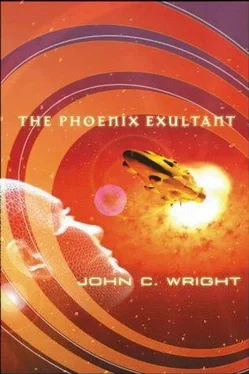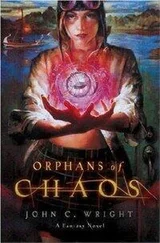"Men are not so irrational as that."
"Are they not? Are they not? You have never known war, young fool. Of whom were you so afraid when you stood at the top of the ramp of this, my ship? Irrational creatures from another star who seek your murder? Or is that a delusion only of your own? Come now! Either you are deluded, or they are mad. Neither option speaks well for the future of peaceful star colonization." The creature opened and shut its several beaks. "I am only sorry that you have failed so utterly."
Phaeton felt the deck tilting under him. In this windowless room, he could not tell what this manoeuvre meant.
He said, "Why? Did you hope for war again so much?"
"Not at all. War is horrible beyond description. It is tolerable only because there is something that is worse. No; you misunderstand what I hope."
"Enlighten me."
"Ah! Yahh! I lived in the last years of the Fourth Era, when vast mass-minds ruled all the Earth. There was no crime, no war, no rudeness, and (except for certain areas in North America and Western Europe) no individuality. It was a static age. There were no changes.
"The Fifth Era came when certain Compositions began to use other brain-formations in their mind-groups. The Warlock brain was quick and intuitive, artistic, insightful. The Invariant brain is immune to passion or fear, immune to threat, immune to blackmail. The Cerebelline brain can see all points of view at once, and understand all elements of complex systems at one glance. We could not compete against such minds as these, nor would they submit themselves tamely to the group-needs of the group-minds. And yet the Fifth Era was finer than the Fourth. Genius and invention ruled. Irrational Warlocks conquered the Jupiter system, which they had no economic reason to do; stoic Invariants methodically colonized the pre-Demeter asteroids, indifferent to suffering or hardship. Cere-bellines, grasping whole thought-systems at once, developed the Noetic Unification Theorem, which led to developments and technologies we mass-minds never would have or could have guessed. Without the self-referencing participles described in Mother-of-Numbers's famous dissertation/play/ equations, the technology for self-aware machines would not have come about. The scientific advances of those self-aware machines are more than I can count, including the development of the Noumenal mathematics, which led to this present age, the age of second immortality.
"Now comes this age; the Seventh, and it is a static age again. So, then, Phaethon Zero of Nothing, do you see? Look back and forth along the scheme of history. There would have been war among the stars if your dream had not been killed. Do not doubt it; the Hortators, and their pet Nebuchednezzar, are smart enough to come correctly to that conclusion. But would that age of war have led to better ages beyond that? Perhaps the Earth and Jupiter's Moons and the other civilized places of the Golden Oecumene would have been destroyed in the first round of interstellar wars. But, if, in return, a hundred planets were seeded with new civilizations, or a million, I say the cost would have been worth the horror."
Phaethon was silent, not certain how to take this comment. Was the cyborg praising him, or condemning him? Or both?
But it did not matter now. The point was academic. The Hortators had won.
"Where are you taking me?" asked Phaethon.
"Yaah! Truly you know nothing of history. There is only one city on the planet that did not sign the Hortator accords, because the Cerebelline-formed mass-mind running it did not care whether she was mortal or immortal, and she did not give in to Orpheus's pressure. Old-Woman-of-the-Sea has governed the Oceanic Environmental Protectorate since the middle of the Fifth Era. She, like me, is far older than your Golden Oecumene. She can afford to ignore the Hortators, since even they would not care to interfere with the mind that controls the balancing forces between all the plankton and all the nanomachinery floating in the waves, or who shepherds the trillion submicroscopic thermal cells of all the tropic zones, which disperse or condense the ocean heat and hinder the formation of tornadoes. Her city is called Talaimannar."
"The place Harrier told me to go!" exclaimed Phaethon happily. Now he would find out what mystery, what subtle plan the superintellect of Harrier had in mind.
"Of course, young fool," said the cyborg. "If I dropped you any other place, I would be guilty of helping you commit an act of trespass. Why do you think the Hortators let me get away with this? I am not helping you. It takes no genius to figure out you must go to Talaimannar; there is no other place to go. It is where all cast-offs and gutter-sweepings go."
Phaethon felt a sensation of crushing despair. All this time, he had been nursing the secret hope that Harrier Sophotech had some plan, some unthinkably clever scheme, to extract Phaethon from this situation, a plan that would bear fruit once he reached Talaimannar. It had comforted him during his many sleepless nights, his nightmare-ridden slumbers.
But no. Harrier had not been telling him anything other than what all other exiles were told.
It had been a foolish hope to begin with. While it had lasted, the foolish hope had been better than no hope. In order to go on, one needed a reason to go on. What was to be Phaethon's reason now?
A vibration shivered through the ship frame.
"We're here," said the cyborg. "Get out."
A hatch Phaethon had not seen before now opened in a section of the deck. Beyond was a gangway leading down and out. Phaethon blinked in a splash of reflected sunlight shining up through the hatch from below. He smelled fresh tropic air, heavy with moisture and orchid-scents; he heard the noise of surf, the raw calls of seabirds.
"Wait," said Phaethon. "If I am not hallucinating, then there are agents from another star hunting me, then to send me out there, the one place all exiles go, is to send me to the one place where they will find me."
"I have very ancient privileges, which even the formation-draft of the Foederal Oecumenical Commonwealth Constitutional Logic recognizes. It is called a grandfather clause. Legal rights that existed from before the Oecumene are stiD recognized by the Oecumene. An historical curiosity, is it not? The movements of my airships are surrounded by privacy; I cannot be traced, except at court order, and I fly below the levels air-traffic control requires. I am well-known in Kisumu; I have flown the routes to Quito and Samarinda for a thousand years. Any housecoater or perigrinator of the street could point my ship out, and know I can move unnoticed. You understand? That is why the Deep Ones patronize me. They wish for privacy as well. Until and unless you give yourself away, such as, for example, by logging on to the mentality, you should be safe here from your imaginary foes."
Phaethon stepped over to the hatch, but turned, and spoke over his shoulder. "You said there was one thing even worse than war, a thing so terrible that even war is tolerable by contrast. What is it?"
"Defeat." And a robotic arm came from the wall, took Phaethon by the shoulder, and thrust him stumbling down the gangway. Sunlight blinded him. His hands and knees struck the open grillwork floor of the docking tower with a clash of noise. The shadow of the airship passed over him. He rose to his feet and looked up in time to see the huge cylindrical machine rise up out of reach, abandoning him.
Phaethon was again alone.
Through the mesh and underfoot, Phaethon could see lush greenery, a reach of rocky sand and beach, and, beyond that, an ocean blackened with nanomachinery, crowded with false-trees. To the opposite side, away from the beach, were a cluster of spiral pearly growths, domes and towers of spun diamond, buildings like coral or like nautilus shells. These were the organic seashell shapes of the Standard Aesthetic.
Читать дальше











